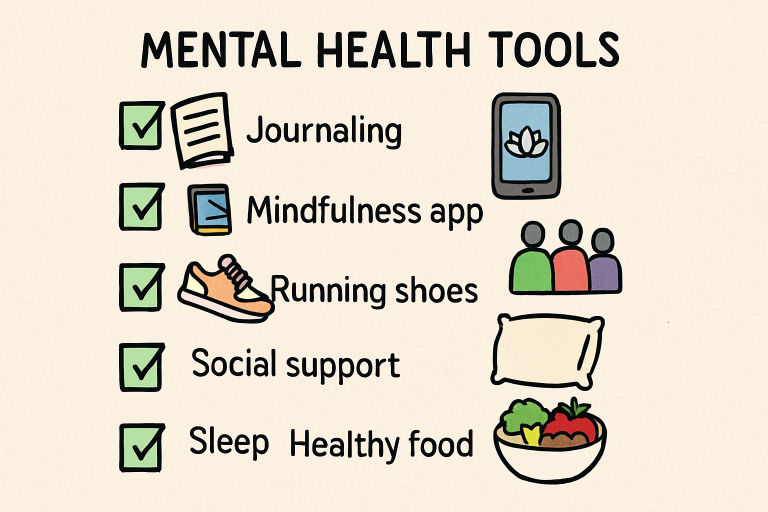Key Takeaways:
- Incorporating simple, daily practices can significantly enhance mental well-being.
- Utilizing technology and community resources offers accessible support for mental health.
- Consistent self-care routines contribute to long-term emotional resilience.
Introduction
Mental health is crucial for a balanced life but often overlooked. Developing practical tools and habits can boost emotional well-being and resilience. Options range from at-home practices to specialized support. Inpatient mental health facility in Pompano Beach offer tailored treatment for those facing significant mental health challenges. Making simple adjustments to daily routines can improve mood, clarity, and stress levels. Various strategies, including mindfulness apps and social connections, can help sustain well-being. Finding the right mix of approaches is essential for experiencing the full spectrum of mental health benefits.
Journaling: A Path to Self-Discovery
Consistently reflecting on your thoughts and emotions through journaling can illuminate patterns, spark introspection, and aid in emotional regulation. This self-exploratory habit is proven to alleviate anxiety, reduce stress, and reinforce positive thinking. According to recent research, even a few minutes of journaling each day can make a meaningful difference in your mental wellness.
Mindfulness and Meditation Apps
The digital age has made mindfulness practices more accessible than ever before. A variety of mobile applications now offer guided mindfulness exercises and meditation sessions tailored to all experience levels. Apps such as Sanvello employ evidence-based methods to manage stress, improve focus, and support mood stabilization. By engaging with these resources, you can integrate short, restorative practices seamlessly into your routine, making mental health care more convenient and personalized.
Physical Activity: A Natural Mood Booster
Physical movement plays a vital role in protecting and enhancing mental health. Regular activities such as brisk walking, yoga, cycling, or dancing stimulate the release of endorphins, the body’s natural “feel-good” chemicals. The impact is significant: exercise reduces symptoms of depression and anxiety and supports emotional resilience over the long term. Even brief high-intensity workouts have shown positive results, making it easy to incorporate movement regardless of how busy your schedule may be.

Social Connections: Building a Support Network
Human connection is foundational to mental resilience. Maintaining nurturing relationships with friends and family, participating in group activities, or joining local support networks can help counteract feelings of isolation. Small gestures—such as sending a check-in message or sharing a coffee—provide comfort and foster a sense of belonging. Community participation, in particular, has been linked to higher levels of happiness and overall mental health. These interactions continuously reinforce your emotional foundation, making life’s challenges easier to navigate.
Sleep Hygiene: Restoring the Mind
Quality sleep is closely linked to cognitive function, mood stability, and stress tolerance. Establishing healthy sleep habits—such as maintaining a consistent sleep schedule, creating a calming bedtime environment, and powering down electronic devices—can significantly improve the overall duration and quality of your rest. Practicing relaxation rituals such as reading, meditation, or breathing exercises before bed further prepares your mind and body for restorative sleep. Comprehensive sleep hygiene practices are an essential pillar of lasting mental well-being.

Nutrition: Fueling Mental Well-being
The connection between diet and mental health is well established. Consuming a diet rich in whole foods, healthy fats like omega-3s, and plenty of fresh fruits and vegetables supports optimal brain function. Minimizing ultra-processed and sugary foods helps stabilize mood and energy. Nutrients such as vitamins B, D, and magnesium are particularly important for mental clarity and emotional regulation.
Professional Help: Seeking Guidance
At times, self-help strategies may not be enough. Working with mental health professionals offers expert support through therapy, counseling, or medication management, tailored to your individual needs. Innovative services like Cope Notes deliver daily positive messages and affirmations for ongoing encouragement. If symptoms persist or intensify, seeking support from specialists ensures you receive appropriate care and resources on your journey to improved mental health.
While we spend billions on physical health annually, the most powerful mental health tools often cost nothing but intention. Recent research reveals that simple, evidence-based practices can produce remarkable changes in psychological well-being—sometimes rivaling the effects of traditional therapy or medication.
1. The Three-Minute Breathing Space: Your Emergency Reset Button
When stress hijacks your day, the Three-Minute Breathing Space technique offers immediate relief. For the first minute, we observe how we are feeling, and describe those feelings in words. For the second minute, we practice awareness of breath. For the third minute, we continue focusing on the breath but extend awareness to the whole body.
This technique, developed by mindfulness-based cognitive therapy pioneers, acts as a circuit breaker for anxious thinking. A client overwhelmed by a work conflict often spirals into anxious thinking. The therapist introduces the Breathing Space as a quick reset tool. During a session, they practice pausing, observing the tightness in their stomach, and focusing on their breath for three minutes. At home, the client uses this exercise after a tense email exchange, finding it calms their mind and reduces impulsive reactions. The beauty lies in its simplicity—no equipment, no special location, just three minutes of structured attention.

Quick Practice Guide:
- Minute 1: Notice your current emotional state without judgment
- Minute 2: Focus entirely on your breathing rhythm
- Minute 3: Expand awareness to include your whole body
2. Gratitude Journaling: The Five-Minute Mental Health Transformer
The science is compelling: a 2024 study on gratitude published in JAMA Psychiatry by Chen et al. found that respondents with gratitude scores in the highest third during the beginning of the study showed a 9% lower risk of dying in the next 4 years compared to respondents with scores in the bottom third. But gratitude’s impact extends far beyond longevity.
A meta-analysis of 64 randomized clinical trials demonstrated that patients who underwent gratitude interventions experienced greater feelings of gratitude, better mental health, and fewer symptoms of anxiety and depression. Specifically, participants who underwent gratitude interventions had greater feelings of gratitude (up to 4% higher scores), greater satisfaction with life (6.86% higher), better mental health (5.8% higher), and fewer symptoms of anxiety and depression (7.76% and 6.89% lower scores, respectively).
The Evidence-Based Method: Take time either at night or in the morning to write down something that went well. Dedicate a notebook or journal to gratitude so you can reflect and remind yourself of those moments. Research shows that practicing gratitude — 15 minutes a day, five days a week — for at least six weeks can enhance mental wellness and possibly promote a lasting change in perspective.
3. The STOP Technique: Mindfulness in Motion
When emotions threaten to overwhelm, the STOP technique provides structure. The acronym STOP stands for four essential steps: Stop, Take a Breath, Observe, and Proceed Mindfully. Each step is designed to interrupt automatic, often unhelpful responses, while building greater self-awareness and supporting more thoughtful, effective decision-making.
This DBT-derived tool transforms impulsive reactions into intentional responses. The STOP Technique helps individuals recognize and accept their emotions without being governed by them, promoting a more balanced and adaptive response to stressors. Through consistent practice, the STOP Technique becomes a valuable skill in fostering emotional resilience and creating a foundation for lasting emotional well-being.
4. Sleep Hygiene: The Foundation of Mental Resilience
The connection between sleep and mental health is bidirectional and profound. A meta-analysis of 72 interventions that improved sleep quality relative to a control condition revealed that improving sleep quality had, on average, a medium-sized effect on mental health, including clear evidence that improving sleep reduced depression, anxiety, and stress.
Research shows disturbing statistics: Participants with depression were found to be significantly higher among the poor hygiene group (75.8%) in comparison to those having good hygiene practices (59.6%). Additionally, The rates of excessive or severe daytime sleepiness were significantly higher among individuals with poor hygiene practices (22.5% versus 11.7% and 5.2% versus 1.2%).
Evidence-Based Sleep Strategies:
- Maintain consistent sleep-wake times (even on weekends)
- Avoid screens 1 hour before bed
- Keep bedroom temperature between 60-67°F
- Exercise regularly (but not within the few hours before going to bed)
- Use your bed only for sleep, not for work or entertainment
5. Progressive Muscle Relaxation: The Body-Mind Bridge
Progressive muscle relaxation (PMR) is a commonly used relaxation technique in CBT that aids in managing stress and anxiety. By systematically tensing and then relaxing different muscle groups, individuals can achieve optimal relaxation. This practice enhances awareness of bodily sensations, which aids in identifying signs of stress.
This technique works by teaching your nervous system the difference between tension and relaxation—a distinction often lost in chronic stress. Regular practice enhances body awareness, helping identify stress signals before they escalate.
6. Cognitive Restructuring: Rewiring Negative Thought Patterns
Our thoughts shape our reality more than we realize. Research shows that mindfulness improves concentration, pain management, and emotion regulation. Mindfulness meditation can significantly help with mental difficulties like depression, anxiety, and addiction, leading to better emotional health.
The overarching theoretical premise of MBIs is that, by practicing mindfulness, individuals learn to develop a different relationship to their thoughts and emotions, which leads to symptom reduction. The process involves:
- Identifying negative automatic thoughts
- Examining evidence for and against these thoughts
- Developing balanced, realistic alternatives
- Testing new perspectives through behavioral experiments
7. Digital Mental Health Tools: Technology as Ally
The digital revolution has democratized mental health support. Mental health apps make it easier to practice evidence-based therapy exercises from the comfort of wherever you are. Apps are a convenient way to get extra support between therapy sessions or office visits, and they can offer continued support after graduating from therapy. However, quality varies dramatically.
Evidence-Based Digital Options:
- Apps using validated CBT techniques
- Programs incorporating mindfulness-based interventions
- Platforms offering structured gratitude exercises
- Tools providing sleep tracking with behavioral recommendations
Remember: Mental health apps aren’t designed to diagnose a condition or substitute care from a mental health professional.
The Integration Challenge: Making It Stick
Research consistently shows that combining multiple evidence-based techniques produces superior outcomes. Wong and Brown (2017) found that a combined gratitude practice/counseling approach is more effective than either alone, with Group one reporting “significantly better mental health four and 12 weeks” after the intervention ended.
Creating Your Personal Mental Health Toolkit:
- Start with one technique for two weeks
- Add a second practice once the first becomes habitual
- Track your mood and symptoms to identify what works
- Adjust timing and frequency based on your response
- Remember: consistency trumps perfection
The Dose-Response Relationship
Perhaps the most encouraging finding is the dose-response relationship in mental health interventions. There was a dose–response relationship between improvements in sleep quality and subsequent mental health, such that greater improvements in sleep led to greater improvements in mental health. This means every small step counts—you don’t need perfection to see benefits.
A Note on Professional Help
While these tools are powerful, they complement rather than replace professional care for serious mental health conditions. CBT for insomnia (CBT-I) has a proven track record in reducing sleeping problems. A large clinical trial also showed that CBT-I could reduce symptoms of many mental health conditions, improving emotional well-being and decreasing psychotic episodes.
The Science of Small Changes
Several studies have shown that writing down the details of positive experiences you had throughout the day, week, or month can help condition your brain to be more appreciative of the things you have to be grateful for. Furthermore, A 2022 study by Sohal et al. found that a journaling intervention can provide a small to moderate benefit, with a 5% difference in the decrease in scores on patient health measures between the control group and the experimental group in the study.
The evidence extends to workplace applications: 102 practitioners were divided into three groups, with those who wrote a work-related gratitude journal experiencing a decline in stress and depressive symptoms when compared to the other two groups.
Final Thoughts
Building a personalized toolkit of mental health strategies allows you to better respond to daily stressors and maintain emotional balance. By journaling, staying active, nurturing connections, practicing good sleep and nutrition, and seeking professional support when needed, you can take meaningful steps toward long-lasting well-being. Every effort, no matter how small, has a place in creating a more resilient and fulfilling life.
Mental health isn’t a destination but a practice. These evidence-based tools offer practical, accessible ways to build psychological resilience. The research is clear: small, consistent actions can produce significant changes in mental well-being.
Start today. Choose one technique. Give it three weeks. Your future self will thank you.

